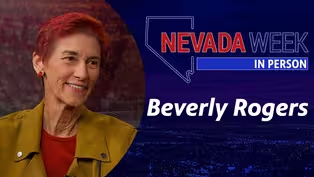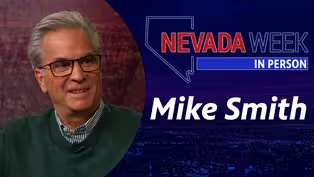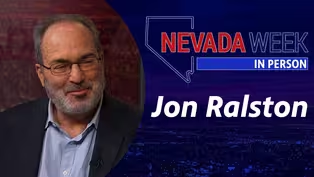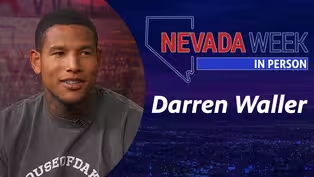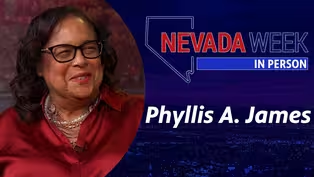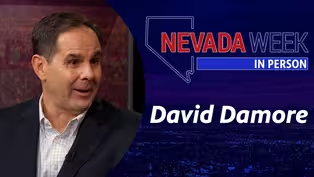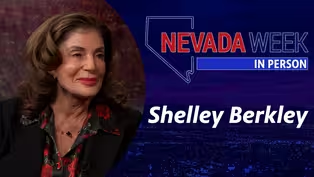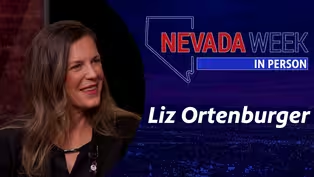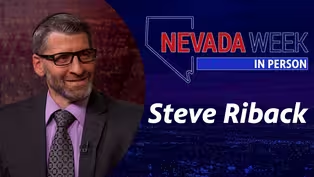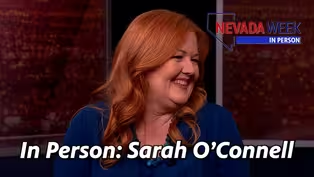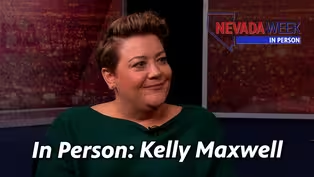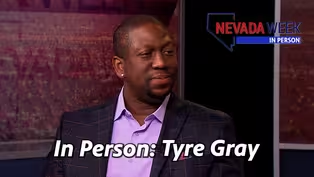
Nevada Week In Person | DeRionne Pollard
Season 1 Episode 44 | 14mVideo has Closed Captions
One-on-one interview Nevada State College President DeRionne Pollard.
One-on-one interview Nevada State College President DeRionne Pollard.
Problems playing video? | Closed Captioning Feedback
Problems playing video? | Closed Captioning Feedback
Nevada Week In Person is a local public television program presented by Vegas PBS

Nevada Week In Person | DeRionne Pollard
Season 1 Episode 44 | 14mVideo has Closed Captions
One-on-one interview Nevada State College President DeRionne Pollard.
Problems playing video? | Closed Captioning Feedback
How to Watch Nevada Week In Person
Nevada Week In Person is available to stream on pbs.org and the free PBS App, available on iPhone, Apple TV, Android TV, Android smartphones, Amazon Fire TV, Amazon Fire Tablet, Roku, Samsung Smart TV, and Vizio.
Providing Support for PBS.org
Learn Moreabout PBS online sponsorshipMore from This Collection
Nevada Week In Person goes beyond the roundtable discussion of Nevada Week with guests for a more casual conversation about their personal passions, new projects and compelling stories that are overlooked in the flurry of the news cycle.
Nevada Week In Person | Beverly Rogers
Video has Closed Captions
One-on-one interview with Rogers Foundation chair Beverly Rogers. (14m)
Nevada Week In Person | Mike Smith
Video has Closed Captions
One-on-one interview with Las Vegas Sun political cartoonist Mike Smith. (14m)
Nevada Week In Person | Jon Ralston
Video has Closed Captions
One-on-one interview with The Nevada Independent CEO Jon Ralston. (14m)
Nevada Week In Person | Darren Waller
Video has Closed Captions
One-on-one interview with Las Vegas Raider tight end Darren Waller. (14m)
Nevada Week In Person | Phyllis A. James
Video has Closed Captions
One-on-one interview Phyllis A. James. (14m)
Nevada Week In Person | David Damore
Video has Closed Captions
One-on-one interview with Chair of the Department of Political Science at UNLV David Damor (14m)
Nevada Week In Person | Shelley Berkley
Video has Closed Captions
One-on-one interview Senior Vice President for Touro University Shelley Berkley. (14m)
Nevada Week In Person | Liz Ortenburger
Video has Closed Captions
One-on-one interview with SafeNest CEO Liz Ortenburger. (14m)
Nevada Week In Person | Steve Riback
Video has Closed Captions
One-on-one interview with Las Vegas Metro Police Lieutenant Steve Riback. (14m)
Nevada Week In Person | Sarah O’Connell
Video has Closed Captions
One-on-one interview with Director of Eat More Art LLC Sarah O’Connell. (14m)
Nevada Week In Person | Kelly Maxwell
Video has Closed Captions
One-on-one interview with Baby’s Bounty Executive Director Kelly Maxwell. (14m)
Nevada Week In Person | Tyre Gray
Video has Closed Captions
One-on-one interview with Nevada Mining Association President Tyre Gray. (14m 1s)
Providing Support for PBS.org
Learn Moreabout PBS online sponsorshipFrom food stamp recipient to leader of one of the fastest growing colleges in the country, Nevada State College President DeRionne Pollard is our guest this week for Nevada Week In Person.
♪♪♪ Support for Nevada Week In Person is provided by Senator William H. Hernstadt.
-Welcome to Nevada Week In Person.
I'm Amber Renee Dixon.
In August of 2021, the Nevada System of Higher Education, Board of Regents appointed her President of Nevada State College and in doing so, she became the first permanent Black woman president of any institution within the Nevada System of Higher Education.
DeRionne Pollard, Thank you for joining us for Nevada Week In Person.
(DeRionne Pollard) I am honored.
Thank you, Amber.
-So your Nevada State College biography says you are a graduate of the Chicago Public School System, a former food stamp and public assistance recipient, and the first generation in your family to graduate college.
How do those characteristics influence who you are today?
-I think they are the ethos of who I am, to be quite frank.
All of us show up in different ways, and we typically show up with the experiences that we have.
And for me, it deeply connected me to Nevada State, literally, as a girlfriend said, Have you heard about this job?
And I looked at the job description, and I started to read about the institution's deep commitment to first generation college students.
It's an unabashed, unapologetic commitment around social justice and a very profound commitment to making sure that no Nevadan is left behind.
And as a result of that, when I saw it, I said, This is my place; these are my people.
And I want to be a part of what I think is something tremendous that's happening within this institution.
And here I am.
-How does a college commit itself to social justice?
-I think, one, you have both a promise, a practice, and policies that align in a way to say that, as an institution, we know that no member of our community is expendable.
And we also believe that we want students to show up fully as who they are.
And as a result of that, we align ourselves in that way: how we provide robust support services, how we take positions on issues that may keep some people away from college, but we bring them to our institution.
And then most importantly, how we choose to make sure that our students are deeply connected to the communities that we serve.
80% of Nevada State graduates stay local.
So it is important for us that we make sure that not only do they have excellence in instruction, but they understand they're going to be our community's leaders, because they will stay right here in this community to do so.
-Could you give me an example of a policy that you have changed or influenced in order to bring people in who may have not wanted to, or been deterred for some reason?
-Yeah.
I think part of it-- And I think with a context, Amber, that question is really important.
Depending on what survey you look at, Nevada ranks 46 in terms of the number of adults who have attained a college degree.
So as a result of that, we have to be very deliberate, one, in thinking about how we attract people to our institution.
So whether it be through dual credit programs, whether it be through early college initiatives, whether it be through our positions on DACA and Dreamers and undocumented students that we say, Come to us as you are.
We want you here at this institution, and we're going to work to help craft the pathway to success for you.
And to make sure that all students move from the margins in the outside of the institutions, and sometimes in our communities, to the center of where we do our work at Nevada State.
And that's been, I think, something established far before I arrived.
But now how do we go deeper and to make sure that our policies and practices continue to align in those spaces?
-Will you remind people of why it is important to bring people from the margins to the center.
-I love that question, and thank you for that.
Because I think one of the things that we often forget is that we all benefit if we're able to make sure that everyone is successful.
There's a great quote that I love.
One of our Presidents is often attributed to saying that: "A great society will ultimately be judged by how it treats its littlest, its last, and its least."
So when I think about this, people who are new to this country, when I think about folks who are living oftentimes in poverty and trying to pull themselves up to the middle class, when I think about all of the benefits that come from being and living in a well educated community-- less dependence on social services, lower crime, greater voter engagement, all the things we know, better health outcomes-- why would we not want to live in a community where everyone is well educated?
And as a result of that, we have to make sure that those who didn't see themselves as an option for higher education see themselves in the images, in the programs, and the way that we do our work.
And that, to me, is why Nevada State is so tremendously relevant right now.
-So Nevada State College.
It's not a university; it's not a community college.
What is it?
-You know what I find interesting about this, it's a fairly new phenomenon for Nevada.
Nevada State College is 20 years old.
We are, indeed for all intents and purposes, a university.
We are a state institution.
We provide both baccalaureate degrees and we also have graduate programming.
And we'll be expanding that to offer additional master's and specialist degrees in that space.
And I think that's part of the interesting dynamic.
We are working right now with our Board of Regents and with our accreditors and others to make that transition from Nevada State College and to really look at this as a branding opportunity.
The data is compelling.
When you look at when an institution changes its name from college to university, not only do you see an increase in number of people who choose to attend that institution-- now keep in mind what I said earlier about the lack of educational participation we have in this state --and we also see that the value of the credential increases a student's lifetime earning.
So for me, why would we not want to have a community that says not only do we have a phenomenal and excellent community college system and we have a phenomenal and excellent Research 1 institution, and, guess what, we have an excellent and phenomenal State University that is meeting the mid tier of the educational spectrum.
-And so the Board of Regents has tabled the approval until a meeting in December.
-Yes.
-Of their opposition, what do you believe is the biggest hindrance to you becoming Nevada State University?
-Yeah.
I don't necessarily believe that they are opposed.
What I do believe is that they need more information.
So that is exactly what we are going to be doing.
They've asked for more information in three very specific places: One, any guidance from our creditor, which we're providing that.
In fact, I've had a couple of meetings and conversations with them already to have them prepared to speak on what the process is.
Secondly, they've asked us some very clear understanding about what our Department of Education at the federal level requires, which we already have that guidance.
And then, last, they want to know if there are any things that are necessary as it relates to the Nevada System of Higher Education's policy handbook.
So we're-- Actually, I have a meeting on this tomorrow to review this.
So I believe and I feel very confident in our ability to make the case to them; that we will be able to say this is why this is necessary.
And here's the reason why, Amber: We have so many people who are supporting this, and they understand the value proposition.
I have never seen a community suffer when it has too many universities in it.
What I have seen, communities almost die from the lack of a commitment to higher education.
-I get confused on the accreditation issue.
Do you have to be accredited as a university?
Are there specific requirements for that?
-That is a phenomenal question.
So our creditor actually has no definition of university.
But it does require, based on the delivery of mission of what you have been charged to do, that you have to go through an accountability system.
So for us, we are literally not changing our mission.
We're not asking for us to have any special rights or privileges.
It is literally a branding issue, to recognize the work that we have already done, recognize this is about economic development in equity, and more clearly a title that reflects the work that we're already doing.
So our accreditor, it's a very simple process that you have to prepare, I think, almost a one-page statement as to why this is necessary.
They have a panel who reviews it, and then they come back.
And this takes place after the Board of Regents has taken their action.
So there is a-- My son is in Algebra II right now.
We talk about order of operation.
So there's an order that has to happen.
The Board of Regents have to approve it; it goes to the accreditor, the accreditor makes this decision; and then we're able, hopefully, by the start of the new fiscal year to refer to ourselve in the name of which we already do our work.
-How many accreditors exist out there?
-There are the regional accreditors.
There are approximately, I think, seven regional accreditors nationwide.
So geographically, every sets of institutions are aligned with different accreditors.
So we are part of the Northwest accrediting region.
We go there.
I worked in California.
Because it's so large, they have their own accreditor.
I've worked in three other accrediting regions.
So I'm very familiar with this process.
And sometimes we get caught up in the vernacular, "substantive" change.
You know what?
That's actually set by the feds.
So it's something that every accrediting region has.
But if you're not necessarily close to how education runs and aren't familiar with that vocabulary, sometimes it's like, Whoa, a substantive change?
No.
Substantive is really, it's just a change.
So we have to be able to respond to that.
-Speaking of your past experience, you come to Nevada from Maryland, where you oversaw Montgomery College for 10 years.
You were its first Black woman president in 2010.
You're the first permanent Black woman president of any Nevada System of Higher Education institution.
How does that sound to you?
-It's somewhat overwhelming.
And I have to tell you, I don't really think about it a lot.
I think about how I want to show up.
And at the end of the day-- And I love when you read in the introduction.
I know exactly who I am.
I'm a little Black girl who grew up on the south side of Chicago.
I was raised by a father who profoundly loved his girls and wanted us to be independent and well educated.
I grew up in a community that understood the potency of higher education.
I grew up in a church community that said, Hey, we're going to help, we're going to put our pennies together and help invest in this.
I've been a part of educational institutions that have an access mission that understands that the least of us are entitled to education in a way that the most of us can benefit from.
So I-- I listen to that, and I know at the end of the day how I show up in spaces is important.
I need to be smarter than they think I am.
I think that I have to run faster than they expect me to be.
And each and every day, I got to live in this skin.
So I know who I am.
I'll be 52 next month.
And at the end of the day, I know what I want my tombstone to say.
And at the end of the day, I want it to say that she was a servant for higher education, but she was a hell of a girlfriend.
She was a loving spouse.
She was a phenomenal mother.
Those are the things that I want to be remembered by.
And if, by the way, they have a few other identifiers in there, we'll go ahead and deal with that.
-How do you balance all of that as the president of a college, perhaps soon to be university?
-I do it very deliberately and also realize that I need help in doing that.
So there's a, you know-- Let's say you can have it all, you know?
You can have it all; you just can't have it all at the same time.
I'm very fortunate.
I have a wife who stays and primarily cares for our son, a 15 year old.
I don't know when that happened.
And as a result of that, we think deliberately about how we align our work.
As we say, I'm only the boss at the institution; she's the boss at home.
Our son is our primary focus.
We think about what types of things I say yes to and what types of things I say no to.
I try to work out.
I'm starting a-- We're doing a wellness streak at the institution right now.
And I'm kind of helping people think about mental health, thinking a lot about physical health, spiritual health.
All of those things are a part of that.
So if I can model it and have people who remind me every once in a while, Hey, let's go take a walk, you've been sitting at your desk too long.
Those are the types of things I really work hard at.
-This approach of being self-aware and thinking differently about how you spend your time reminds me of something I've read about you and your utilization of the "knowledge economy."
It's a phrase that you use, and what does it mean to you?
-I think this goes back to also your question about why Nevada State needs to have a name change.
We think about if you look at the economy of this country, starting back from the 1800s.
So we went from a goods economy to a service economy to an experience economy.
The economy that we are in right now is what most of the folks and scholars call a knowledge economy, a technology economy that, now, it is not about-- We don't-- We don't trade feed and go out and teach people how to do certain types of things.
What we're doing right now is we're looking at technology and knowledge in a way that's very different.
That type of economy requires higher education.
It requires us to be very deliberate about ensuring that we are well prepared to respond to all the things.
Dinner last night, we had a great conversation about nanotechnology.
My son starts talking, and we all look at-- Where did this come from?
This is the world that they're growing up in.
So if we want to make sure that Nevada is not left behind, we have to be able to talk about the knowledge economy.
-DeRionne Pollard, thank you for joining us.

- News and Public Affairs

Top journalists deliver compelling original analysis of the hour's headlines.

- News and Public Affairs

FRONTLINE is investigative journalism that questions, explains and changes our world.












Support for PBS provided by:
Nevada Week In Person is a local public television program presented by Vegas PBS
